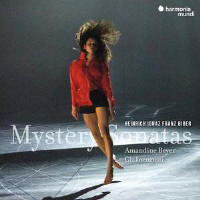Texte paru dans: / Appeared in: |
|
|
Outil de traduction |
|
|
Recordings of Biber’s masterpiece have fallen off slightly since I devoted a Gramophone Collection to it (1/17), but this offers something different. Amandine Beyer and Gli Incogniti hearken back to the lean, urgent approach of Reinhard Goebel – in fact I make her account the fastest to date. Her tone is lean, astringent in a positive sense (reminiscent of Marianne Rônez’s – Winter & Winter, 5/99 – but more richly layered) and her articulation usually incisive, just short of aggressive; surprisingly, this is more evident in the Joyous Mysteries than in the more strident of the Sorrowful ones.
The opening ‘Annunciation’ is exhilarating; it goes like a bat out of hell (sorry) but without feeling forced, and she still extracts plenty of bite from ‘The Scourging’ or ‘The Crowning with Thorns’. The flashiness serves the music and sacrifices practically nothing to accuracy. Only in the final sonata does the upward rush of scales ‘gulp’ slightly. There might be more pathos and variation in timbre, respectively in the tragic or contemplative sonatas (‘The Agony in the Garden’ or the final two Glorious Mysteries, where Julia Wedman and Lisa Tur Bonet excel – respectively Sono Luminus, 7/11; Pan Classics, 10/15) and she occasionally nicks her lower (open) strings in the concluding Passacaglia, but Beyer brings a coherence and a strongly marked identity to the set as a whole. She also makes sense of the Pentecost sonata, which often draws others into difficulties.
Although Gli Incogniti include a low bowed string instrument in the continuo (as in fairness do most other interpreters of the set), they resist the temptation to chop and change their membership between sonatas, which adds to the sense of coherence (in that sense they remind me of Lyriarte and Rüdiger Lotter on Oehms, who use the same ensemble throughout, albeit without a bowed bass). The continuo section doesn’t draw attention to itself but isn’t afraid to ornament lavishly (as in ‘Mary’s Ascension into Heaven’); neither is Beyer herself, though I could have done with still more in the dance pieces, whose repeats surely call for it (few performers do so enough, to my taste).
The Rosary Sonatas are a marathon and one inevitably quibbles with something along the way, but I can see myself returning to this set where other accounts have fallen by the wayside. Whether you’re new to the Rosary Sonatas or are familiar with as many accounts as I am, this one is worth hearing. |
|




